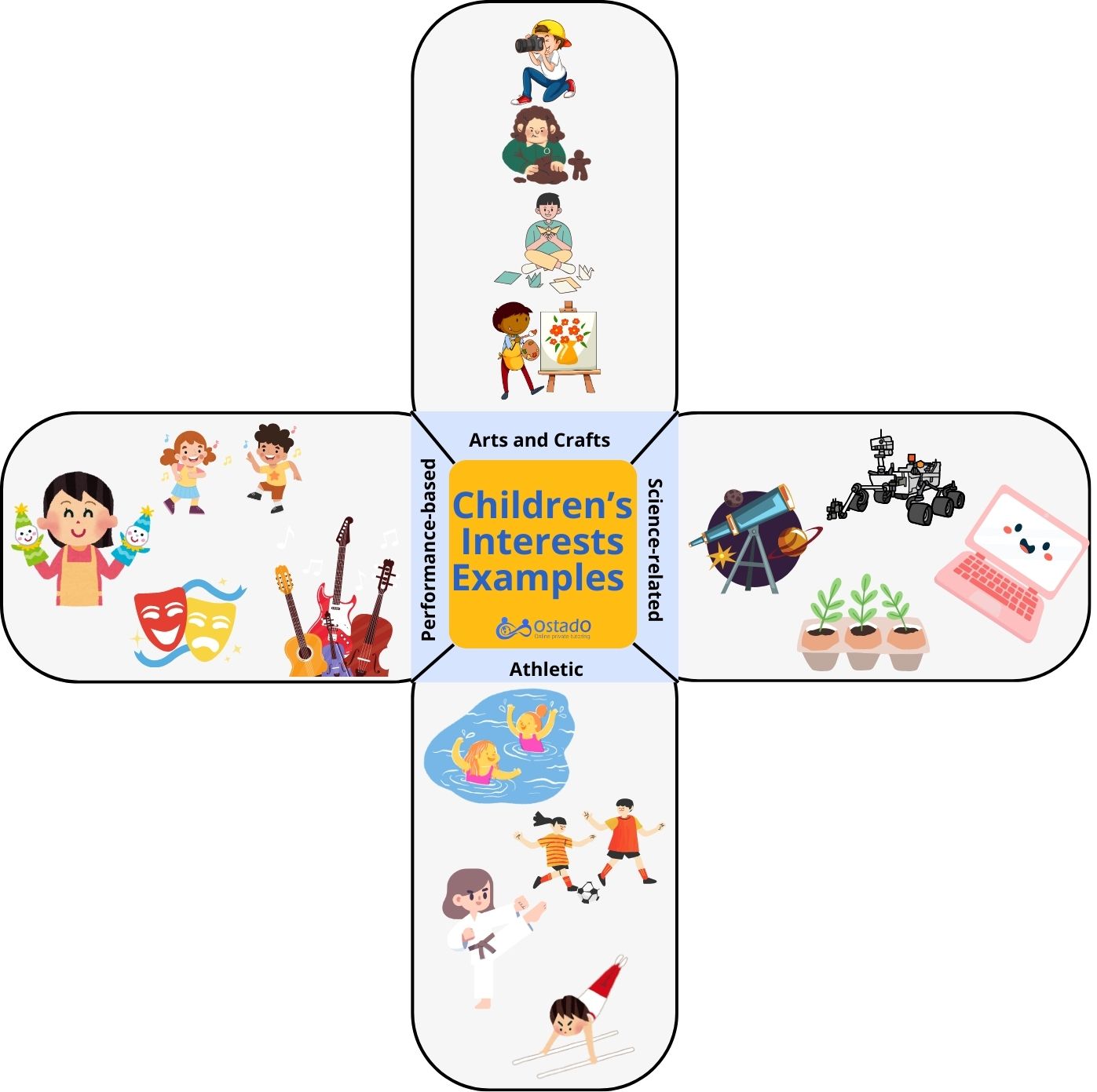There is an old Asian saying that roughly translates into “When dealing with children, you must speak their language.” It’s just easier for everyone if parents adapt themselves to their children’s needs and create a nurturing environment to allow them to be who they want to be.
Hobbies are a significant part of children’s world. These hobbies are, in fact, the most effective way for children to learn new things and develop new skills. Ignoring a child’s interests can have lasting detrimental effects on their development, which may continue into adulthood.
Understanding Children’s Interests
A child’s interest can be anything that grabs their attention. It can be a toy, game, or activity that brings out the best in them. These interests have different degrees. For example, your child is watching his/her favourite cartoon on TV when he/she overhears you talking about going camping. Your child will give up the cartoon and start asking questions about this out-of-the-blue camping trip.
Children’s interests can be divided into two main categories.
Children’s Personal Interests
Personal interests refer to the child’s favourite activity or toy. For example, they might be crazy about a bubble maker or go “vroom vroom” when controlling their RC car on the floor.
Children’s Situational Interests
Situational interests refer to the activities that emerge as the child is exposed to a new setting or experience. Let’s say candy is a personal interest, but trick-or-treating on Halloween is a situational interest.
Read more: Identifying a Child’s Interests
We have expanded on “What are your child’s interests?” and how to identify them in a separate post. I highly recommend reading the article before or after this one to have a clear understanding of your child’s interests. Here, we’ll focus on the instances that children find interesting.
Children’s Interests Examples
There is no concrete typology for children’s interests, but I’ve summarised them into four main groups based on the nature of the activities. You can do some of these activities at home with your children, but you need to sign them up for activities that require a special tools environment. You can find more ideas in the “Child Interests Activity Checklist.”
The activities and hobbies mentioned here can shape your child’s future decisions. So, if you notice your child’s enthusiasm in particular, you can hire a KS 3 tutor to turn these hobbies into actual learning opportunities.

Interests in Arts and Crafts
These interests are observable in most children. Hobbies in arts and crafts allow children to be imaginative and creative. They can express their feelings and communicate with you in what they create. Moreover, creating something out of something else gives children a sense of accomplishment.
- Painting and drawing: Children can visually express themselves and their grasp of the real world. They can also experiment with colours and shapes and gradually develop a sense of aesthetics.
- Sculpting: Sculpting is a great way to familiarise children with 3D shapes and develop spatial awareness. It also takes lots of time and effort, which makes the children more persistent.
- Photography: At a basic level, photography encourages children to pay more attention to their surroundings and appreciate details. Additionally, it develops digital competence.
- Origami: It’s a good hobby for concentration and precision. Creating different forms or shapes with paper improves fine motor skills.
- Pottery: Working with clay is generally enjoyable. Pottery engages the tactile sense and enhances sensory development.
Performance-based Interests
Desiring attention is not limited to childhood, but it’s more evident in children. Performance-based activities give children the spotlight. These activities are healthy means of grabbing the attention of the people around them, particularly you.
- Theatre and acting: It’s a great way to help shy children become more self-assured and comfortable in social situations. It also helps them develop a sense of empathy by playing different roles. Click to learn more about “How to build confidence in children.”
- Musical instruments: Learning to play instruments is all about practice and dedication. It engages both the mind and the body, which improves motor skills. In addition, learning and remembering notes and rhythms enhances the child’s memory.
- Dancing: It involves physical coordination and improves the child’s balance and agility. If they perform in group dances, they can also gain social skills.
- Storytelling: First and foremost, storytelling improves speaking. Young children learn communication skills through storytelling. Furthermore, it improves the child’s vocabulary and leads to the composition of longer and more complex sentences. Overall, storytelling fosters imaginative thinking and language skills.
Science-related Interests
Although this isn’t a definite sign, a child’s interest in certain phenomena can predicate their interest in the respective science. I recall a time when I was crazy about anything related to paper. I was good at drawing, and later, I got excellent grades in literature and essay writing. And now, here I am, making a living out of a sophisticated way of playing with pencil and paper.
- Astronomy: This is an exhilarating subject for all ages. Astronomy is a good subject for curious kids who want to know what’s out there in the universe.
- Robotics: If your child is passionate about robots and creates good ones with the given tools, you may have an engineer in your hands. Robotics can teach children the basics of cause and effect and promote logical thinking.
- Gardening: I still remember the beans I had to grow for science class. It was fantastic to see that I made a living organism. I looked after my plant until it grew and matured. It was an early instance of responsibility. So, you can encourage your children to do some gardening and make them responsible for a task they can accomplish, like planting a tree and watering it regularly.
- Computers: You need little effort to get your child interested in computers. Even playing computer games can help them gain digital competence. So just put them near a computer, and they’re a couple of questions away from working with it.
Interests in Athletic Activities
To state the obvious, interest in athletic hobbies is good for children’s health. It’s a safe channel for them to drain their energy, which helps them sleep earlier and tighter (which means you can sleep better). Sports teach them how to handle wins and losses in competitions and give them an excellent opportunity to make new friends. More than that, sports or even simple outdoor activities like camping are a great way to bond with your kids and create meaningful experiences.
- Swimming: Learning to swim is a vital life skill. That aside, children love playing with water and with the right instructions, they become professional swimmers at a young age. Plus, swimming is a full-body exercise that builds endurance and strength.
- Martial Arts: Martial arts develop agility and stamina. It’s also a good way for children to defend themselves and not worry about being bullied. Of course, they should also learn to control themselves and respect others.
- Soccer: It’s the number-one sport in the UK, and your child might be a future star player. The best thing about soccer is that it teaches teamwork. Additionally, it makes the children think strategically to win.
- Gymnastics: The sport improves balance and flexibility. Also, it’s really beneficial to start gymnastics at an early age if your child shows interest in it.
Additional Resources to Find a Child’s Own Interests
It’s quite uplifting to have so many resources around to help you behave appropriately around your children. Still, not every parent can afford the time to benefit from all these resources. The below resources are excellent for busy parents who want to be involved in their children’s lives, explore the world, and discover new things with them.
|
Resources To Help Parents Find Their Children’s Interests |
||
| Type | Resource | Description |
| Website | Common Sense Media | Reviews and advice on apps, games, and media, helping parents choose suitable content. |
| Parenting Science | Research-based insights into children’s development and hobbies. | |
| What Do We Do All Day? | A blog offering creative and educational activity ideas for children. | |
| Podcast | Brains On! | A podcast that answers questions your children might ask you. |
| Book | The Whole-Brain Child | A book offering insights into fostering children’s emotional and intellectual growth. |
| How to Raise a Reader | Advice on encouraging a love of reading in children, with book recommendations. | |
| Mind in the Making | A guide to developing essential life skills in children through activities. | |
| App | Toca Boca | A suite of fun and educational games, letting kids explore creativity and careers. |
Building on Children’s Interests
Knowing your child’s interests can help you interact meaningfully with them. These interests are indications of their passions and talents, but more importantly, they’re learning opportunities. Observation is one way to find out what your children’s interests are. Their favourite games and toys can give you valuable information about their development.
However, it’s not merely an observation. You should participate in their hobbies but allow them to lead. You’re simply a figure in their story. Therefore, you shouldn’t tell them what to do or correct them.
You can also take a more direct approach and ask your children if they can communicate verbally and what their favourite activities are.
Trying to find out what your child’s interests are makes them feel valued and promotes a sustained learning process. Plus, it boosts their confidence and gives them a sense of self.
FAQs - My Child's Interests
- What is the best example of a child's interest?Children's interests vary in different ages. What's interesting for a 5-year-old might become ordinary when they turn 8. Generally speaking, watching cartoons is an interest that prevails throughout childhood for most children, and we can say it's the best example of a child's interest.
- What interests the kids the most?Children are significantly influenced by their parents and siblings. Their interests most likely align with what they are exposed to at home. This can be different things like a sport, a musical instrument, comic books, stuffed animals, etc.
- What do kids want the most?Aside from material possessions like an RC toy car that causes temporary joy, there are things that children need permanently. These include love, security, and stability. But what they want the most is attention, especially from their parents. Your attention gives them self-esteem and a sense of approval.
- How to determine the best interests of the child?The best way to determine the interests of a child is to observe their behaviour. Follow the child's lead. What makes the child smile? What do they work hard at? When do they show curiosity? What do they prefer to do most often? Answering these questions can tell you what your child's interests are.

